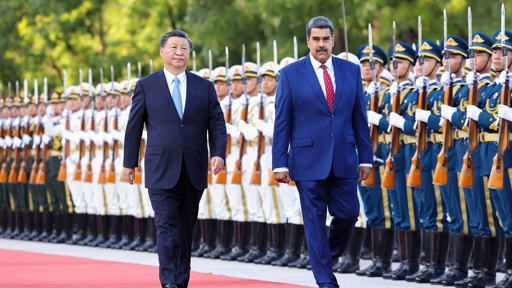This week, China’s Ministry of Foreign Affairs formally expressed its opposition to US military operations in the Caribbean, following an attack on October 15 that left six people dead on Venezuelan vessels. Spokesperson Lin Jian stated that Beijing “opposes the use or threat of force in international relations” and rejects external interference in Venezuela’s internal affairs.
In response to questions from reporters, Lin Jian criticized Washington’s unilateral actions, which mobilized warships and a nuclear submarine in the region under the pretext of combating drug cartels. The October 15 attack brings the total number of deaths in five recent US military actions against Venezuelan vessels to 27.
China also expressed support for the declaration by 33 Latin American countries on the establishment of a nuclear-weapon-free zone on the continent.
China supports strengthening international cooperation to combat transnational crimes and opposes unilateral law enforcement actions by the United States against vessels from other countries that exceed reasonable and necessary limits,” said the Chinese spokesman.
Venezuelan diplomatic mobilization
This week, the Venezuelan Embassy in Beijing also summoned diplomatic representatives from various countries and international media outlets to denounce what it classifies as a risk of military invasion. Ambassador Remigio Ceballos Ichaso told Brasil de Fato that Washington is conducting “a disinformation campaign aimed at justifying an intervention.”
“Accusing Venezuela of being a drug cartel is completely false, a fiction that they have been trying to impose on the international community for decades,” said Ceballos Ichaso.
The Venezuelan government has received expressions of solidarity from Nicaragua, Bolivia, Colombia, Cuba, and Mexico. Humberto Collado, commercial attaché at the Nicaraguan embassy in China, said that “what the US is doing is threatening a democratic country, its president, and its entire people, undermining the socio-political stability of the region.”
Russian and UN position
Russia criticized US military actions through statements by the Ministry of Foreign Affairs and the Russian ambassador to the United Nations, Vasily Nebenzia, stating that such operations “represent an escalation in the region, violate international law and Venezuelan sovereignty.”
The World Drug Report 2025 from the United Nations Office on Drugs and Crime (UNODC) recognizes Venezuela’s efforts to combat drug trafficking and points out that the country is not among the main international drug corridors. The UN has emphasized that any military or coercive intervention that violates the sovereignty of a member state is contrary to the United Nations Charter.
US sanctions against Venezuela began in 2006, during Hugo Chávez’s administration, intensifying after 2013 with Nicolás Maduro, totaling about a thousand restrictive measures by 2019. These measures resulted in food and medicine shortages, restrictions on access to essential resources, and impacts on the Venezuelan economy.
Internal mobilization
President Nicolás Maduro ordered national defense military exercises with the participation of Bolivarian militias and volunteers, including fishermen and rural residents. The government characterized the mobilization as defensive and voluntary, aimed at ensuring national sovereignty.
In a letter to UN Secretary-General António Guterres, Maduro reiterated Venezuela’s commitment to peace and international law. Foreign Minister Samuel Moncada stated that “the real threat to regional peace is the presence of US military and nuclear weapons in the Caribbean.”
This article was translated from an article originally published in Portuguese on Brasil de Fato.
The post China condemns US airstrikes in Caribbean, backs Venezuelan sovereignty appeared first on Peoples Dispatch.
From Peoples Dispatch via this RSS feed


